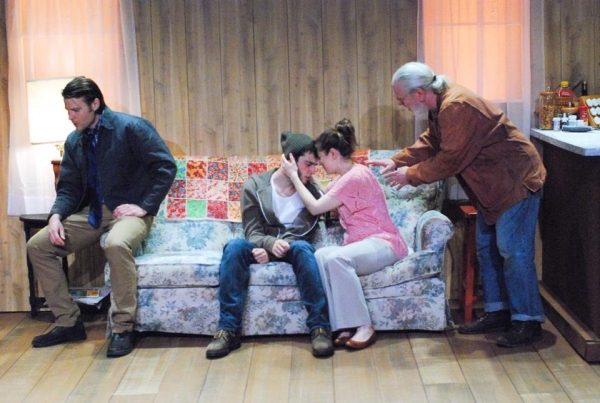Good Television

(© Becca A. Lewis Photography)
The title of Rod McLachlan's play, Good Television, is a double-edged sword with which the author pokes at the not-quite-craven heart of reality TV. The play, which debuted at New York's Atlantic Theater Company last year and is receiving a strong Boston premiere by Zeitgeist Stage Company, is built on a cable show called Rehabilitation (clearly based on A&E's long-running Intervention, on which the playwright's wife worked). And it pits a cadre of bottom-line feeders to whom "good television" means ratings, whatever filmed train wreck it takes to get them, against a field producer to whom "good television" implies the intention to do good by its subjects: in this case the ambushed addicts whose prize, following a surprise family intervention orchestrated by a TV crew, is a free stint in rehab.
Interestingly, Rehabilitation's perpetrators insist on calling their program a "documentary" — as if to place it a notch above Honey Boo Boo and the Kardashians. And McLachlan, a veteran actor turned first-time dramatist, does not disagree. What makes Good Television good theater is that the playwright is not just one more satirist of an arguably questionable art form; he is a smart, knowledgeable examiner of its mixed motives. True, his play threatens to go off the rails in its lurid depiction of the familial smash-up surrounding a very marginal rehab candidate and his trailer-trash kin. But the play's investigation of the reality-TV brass is empathetic and complex — just what McLachlan's wife might have ordered.
At the center of the fray is field producer and trained therapist Connie, who for personal reasons takes her job very seriously. But as the play opens, Rehabilitation has been hoist by the petard of its own popularity. The network wants almost twice as many episodes as have been produced in past seasons but has no intention of staffing up the enterprise. The vetting of potential subjects has therefore grown hasty. And when a tape depicting a not-bad-looking 21-year-old methamphetamine addict comes across the transom, show runner Bernice considers it a "gift." She's on her way out the door to a slimier show on Fox but wants a compelling last hurrah, and her incoming replacement, Ethan, proves an even greater enthusiast for sensationalism. Connie considers young Clemmy MacAddy, five years into a particularly damaging addiction, almost sure to relapse — and she's addicted to her own success rate. But fresh-off-an-MFA-from-USC associate producer Tasia thinks he ought to be given a chance. So after much debate, a team is off to Aiken, South Carolina, where Clemmy is strung out like taffy and his overworked sister, Brittany, is hanging by a thread. Throw in a mercenary older brother who thinks he's better informed about the workings of TV than he is and a long-lost alcoholic dad full of remorse and Jesus, and what ensues looks like the dramaturgical love child of Tracy Letts and Flannery O'Connor. Back in Los Angeles, however, the behind-the-scenes reality-TV dynamic mixes ugly truths with bruising self-realization.
Moreover, David J. Miller's production for Zeitgeist Stage Company gets this mix as right as it's going to get. Whether he's an excellent director or a savvy caster, Miller, as usual, draws uniformly creditable performances from his non-Equity cast. The confident, no-nonsense Connie is the moral heart of the play, and Christine Power brings to her a believable blend of control, empathy, and vulnerability. Shelley Brown, as the ambitious Bernice, martini and situation in hand, is all silk and smoothness worn over a ruthless pragmatism. Among the hopped-up or worn-out Carolinians, Brandeis University student Benjamin Lewin is an explosive if touchingly childlike Clemmy, as physically agitated as he is mentally zoned out. And in the role of his fierce, put-upon sister, Jenny Reagan brims with love and rage without spilling over the top. She's proof enough that reality is rougher than fiction — not to mention cheaper to produce.











